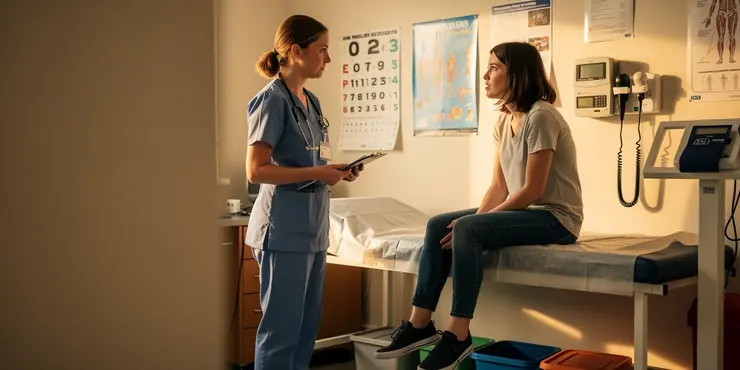
Find Help
More Items From Ergsy search
-
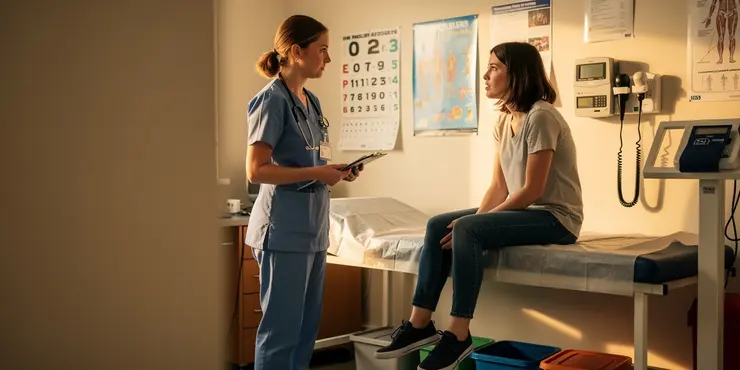
How is appendicitis diagnosed?
Relevance: 100%
-
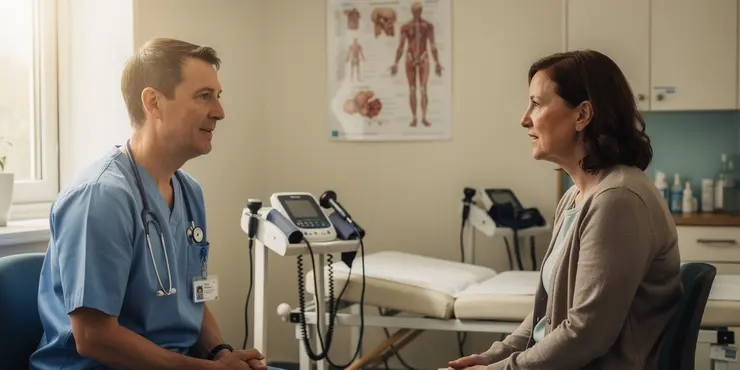
Is appendicitis hereditary?
Relevance: 97%
-
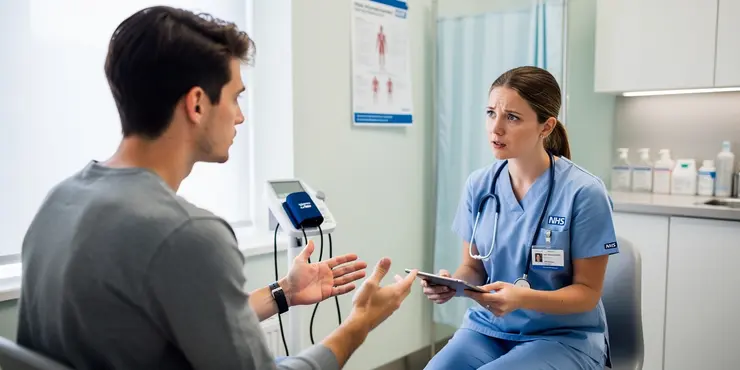
What is Appendicitis?
Relevance: 93%
-
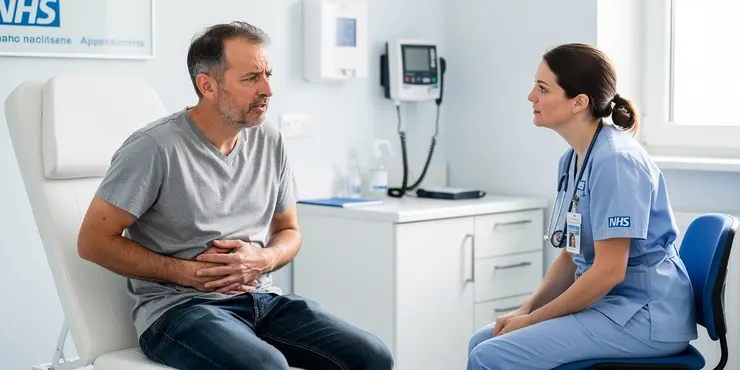
What are the potential complications of appendicitis?
Relevance: 87%
-
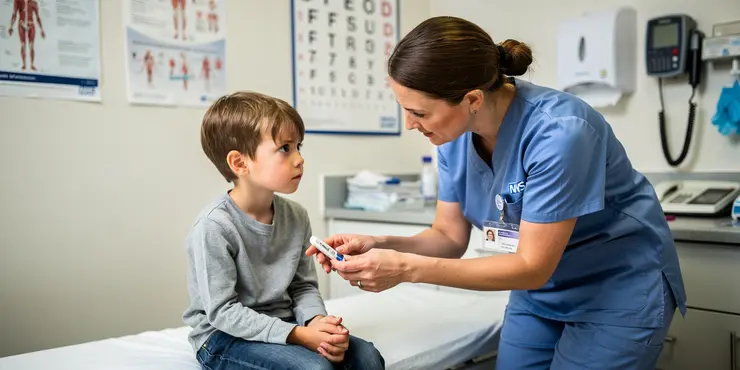
What causes appendicitis?
Relevance: 87%
-
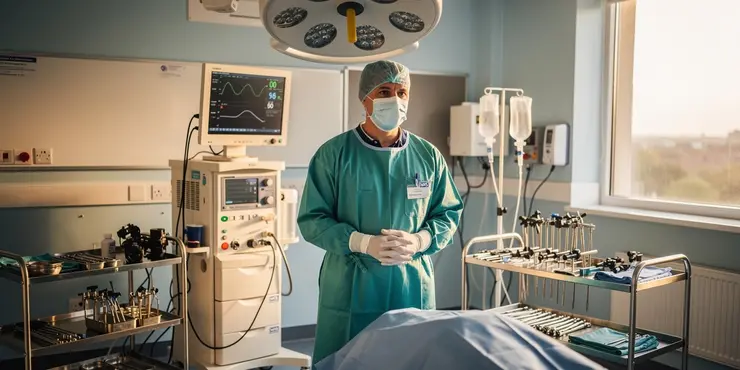
What is the treatment for appendicitis?
Relevance: 85%
-
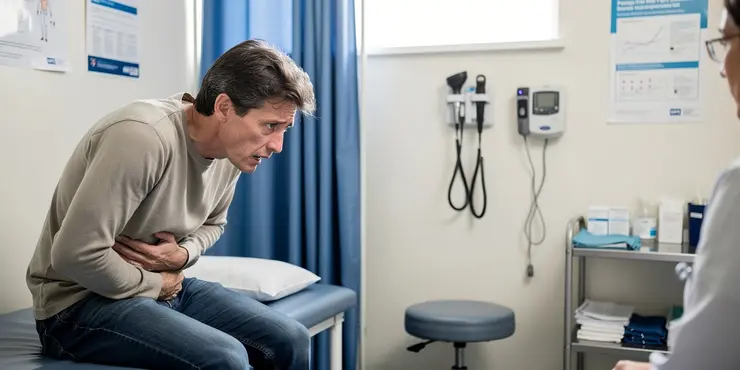
Where is the pain located when you have appendicitis?
Relevance: 85%
-
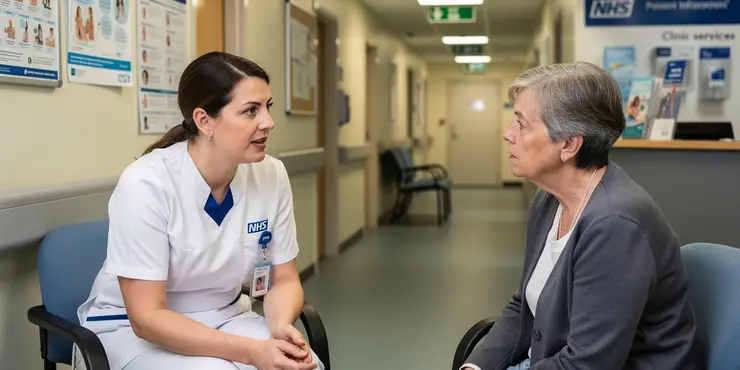
Can appendicitis occur more than once?
Relevance: 85%
-
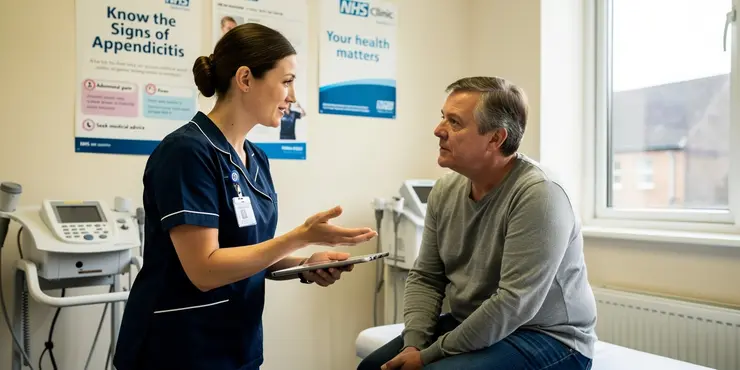
What are the common symptoms of appendicitis?
Relevance: 84%
-
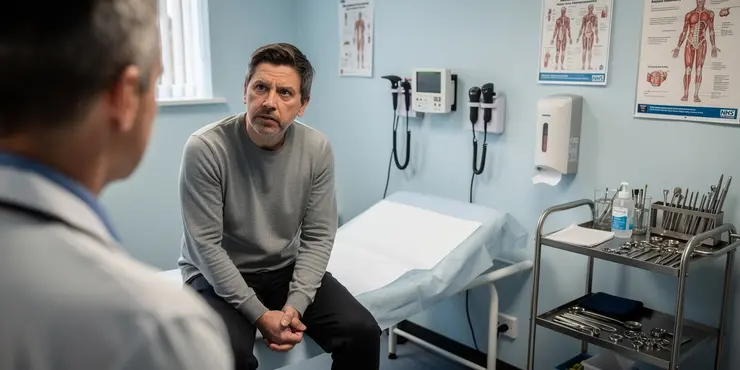
What happens if appendicitis is left untreated?
Relevance: 83%
-
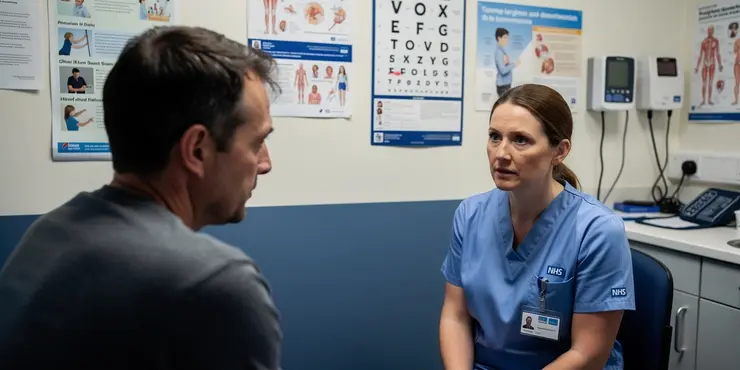
How soon should you see a doctor if you suspect appendicitis?
Relevance: 82%
-
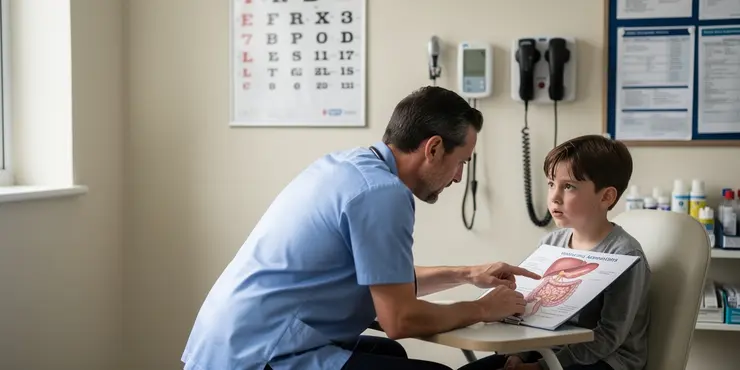
What is the likelihood of needing surgery for suspected appendicitis?
Relevance: 82%
-
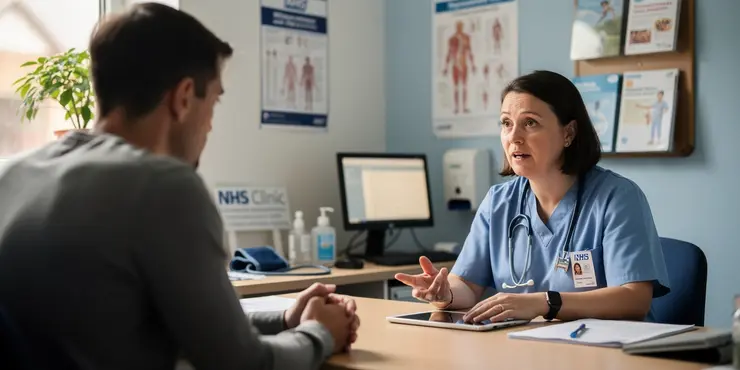
Can appendicitis be treated with antibiotics?
Relevance: 82%
-

Can appendicitis go away on its own?
Relevance: 80%
-
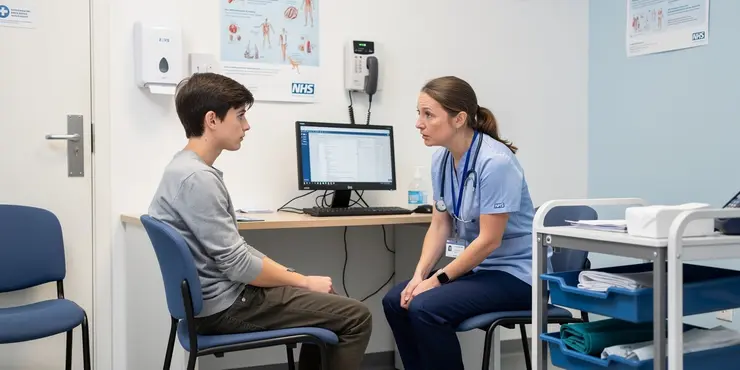
Is appendicitis common in any particular age group?
Relevance: 79%
-
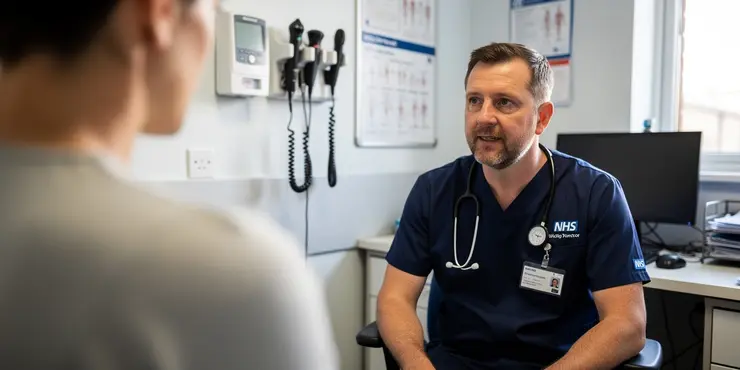
How is appendicitis different from other causes of abdominal pain?
Relevance: 76%
-
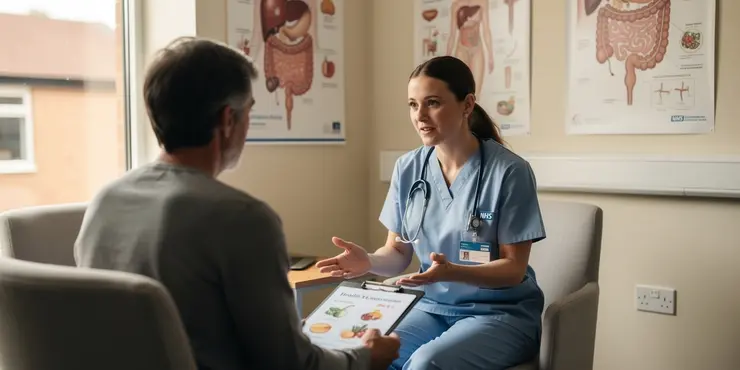
Can diet or lifestyle changes prevent appendicitis?
Relevance: 75%
-
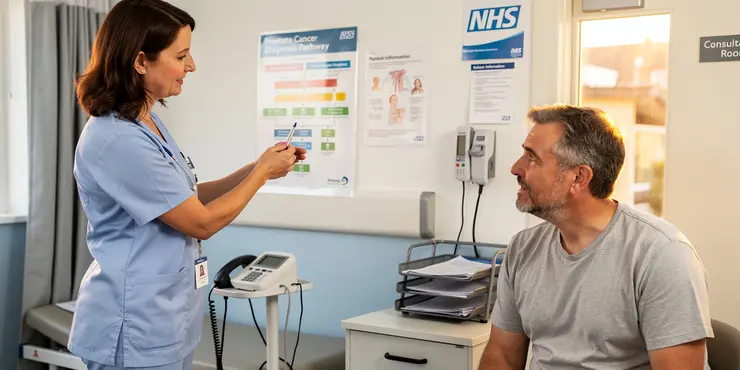
Prostate cancer diagnosis and tests
Relevance: 51%
-

BSL - Diagnosis of panic disorder
Relevance: 50%
-
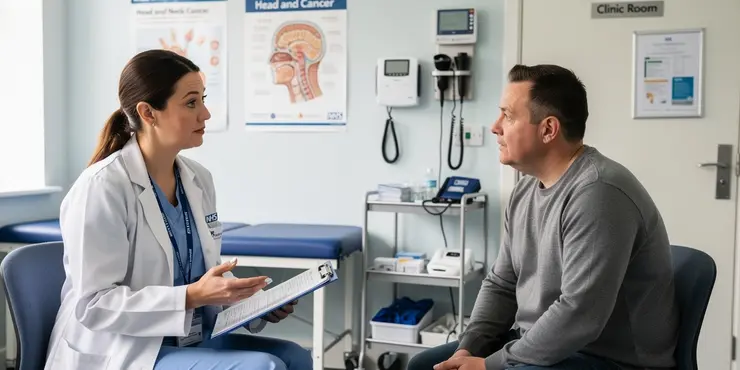
Head and Neck Cancer Diagnosis
Relevance: 50%
-
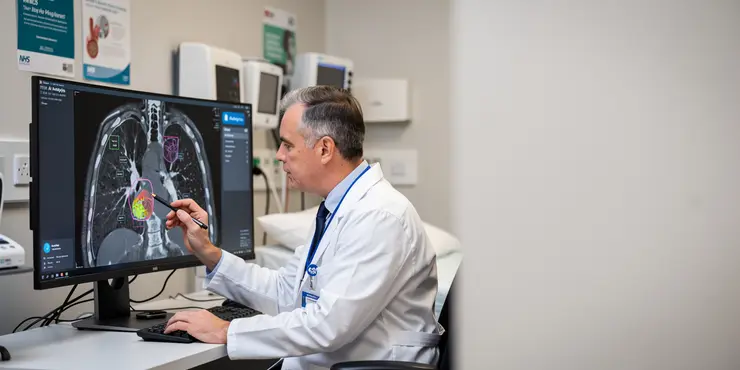
Are AI systems used alone in lung cancer diagnosis or alongside human radiologists?
Relevance: 48%
-
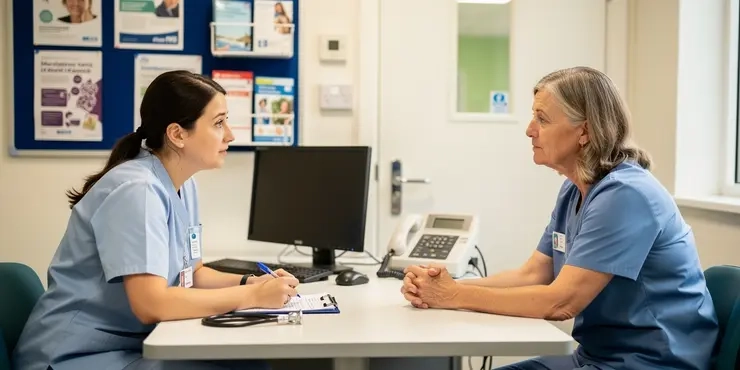
Attention deficit hyperactivity disorder (ADHD) - Diagnosis
Relevance: 46%
-

BSL - Diagnosis of obsessive compulsive disorder (OCD)
Relevance: 46%
-
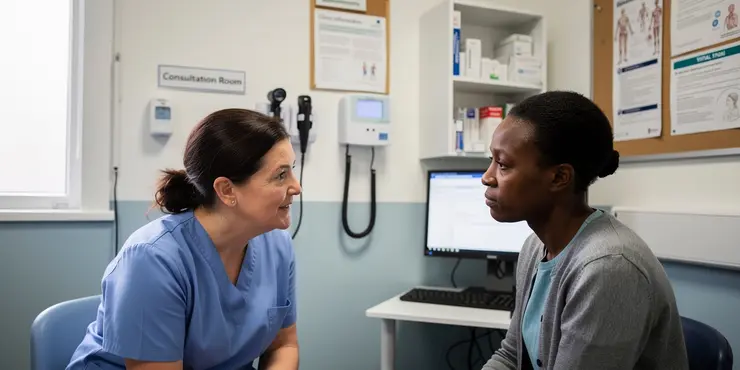
What is the life expectancy after a motor neurone disease diagnosis?
Relevance: 41%
-

Can you live without an appendix?
Relevance: 38%
-
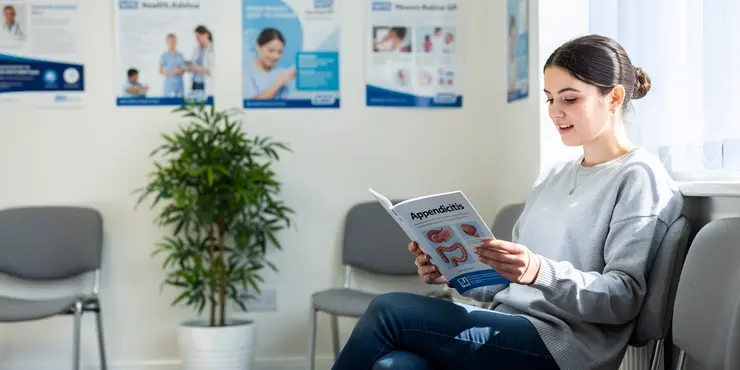
Are there any risk factors for appendicitis?
Relevance: 35%
-
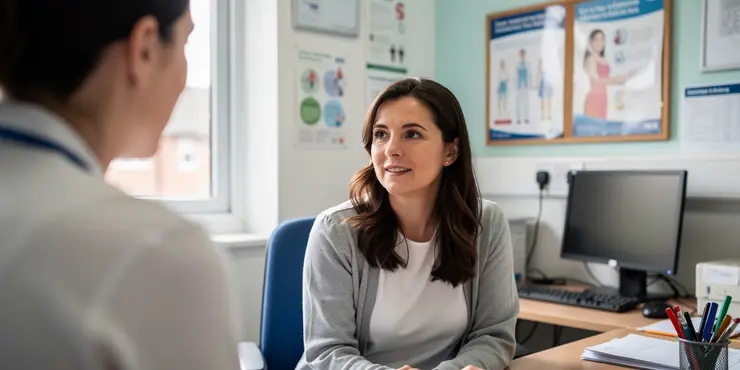
Stomach ache and abdominal pain
Relevance: 21%
-

How is autism diagnosed?
Relevance: 19%
-
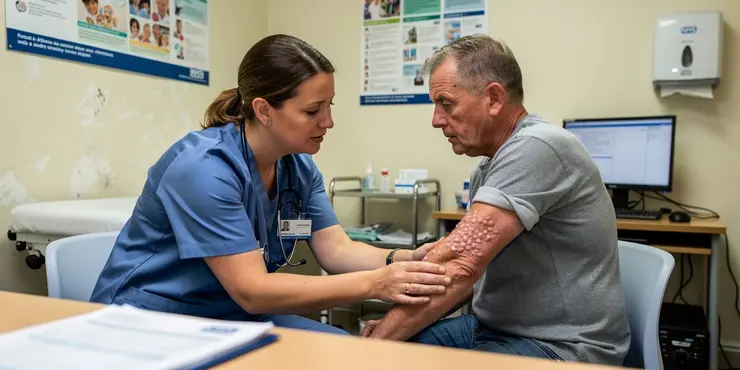
How is shingles diagnosed?
Relevance: 19%
-
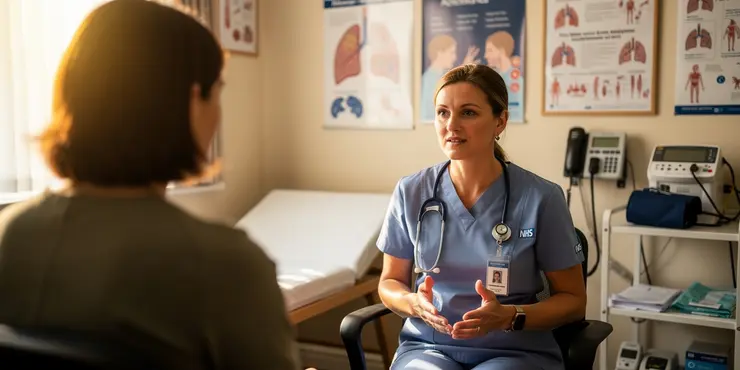
How is asthma diagnosed?
Relevance: 19%
-
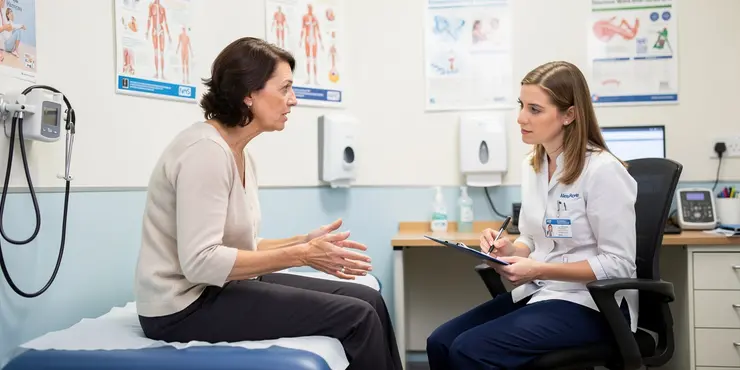
How is scabies diagnosed?
Relevance: 19%
-
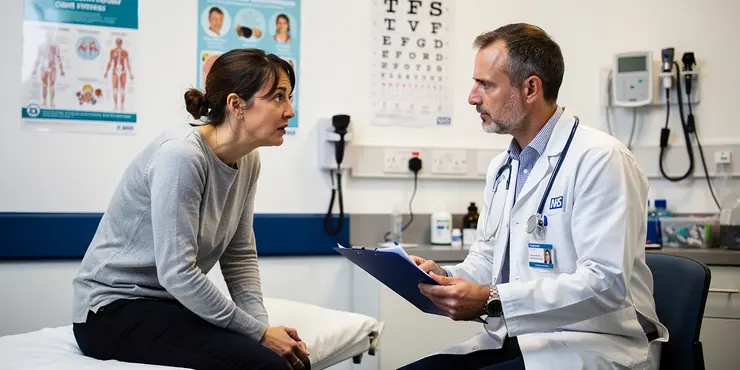
How is flesh-eating disease diagnosed?
Relevance: 19%
-
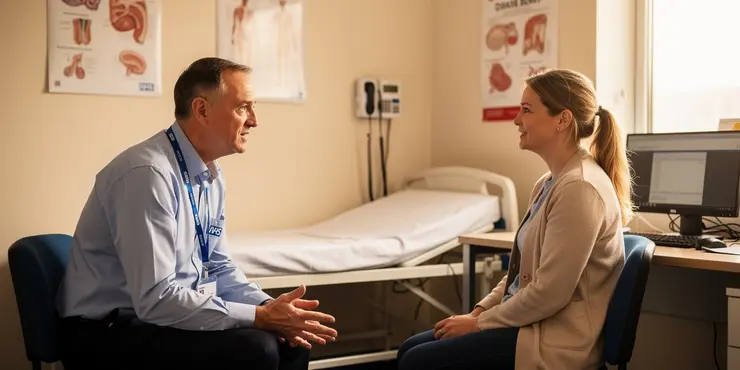
How is motor neurone disease diagnosed?
Relevance: 19%
-
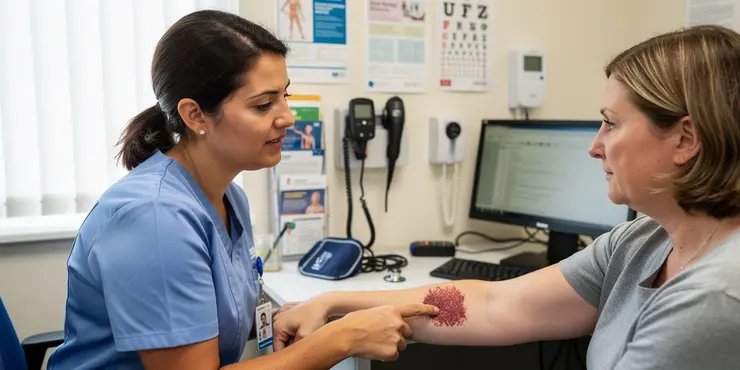
How is psoriasis diagnosed?
Relevance: 19%
-
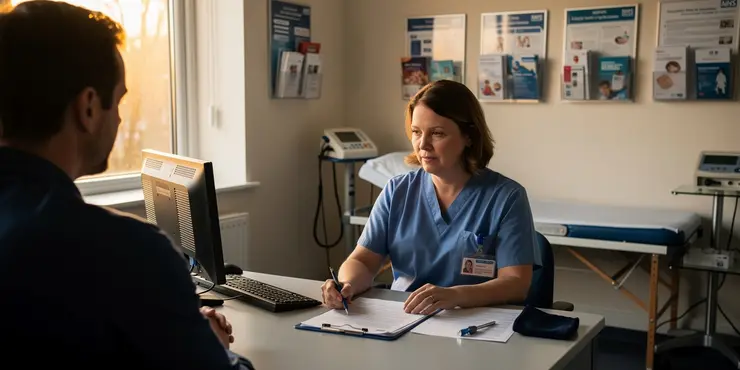
How is Huntington's disease diagnosed?
Relevance: 19%
-
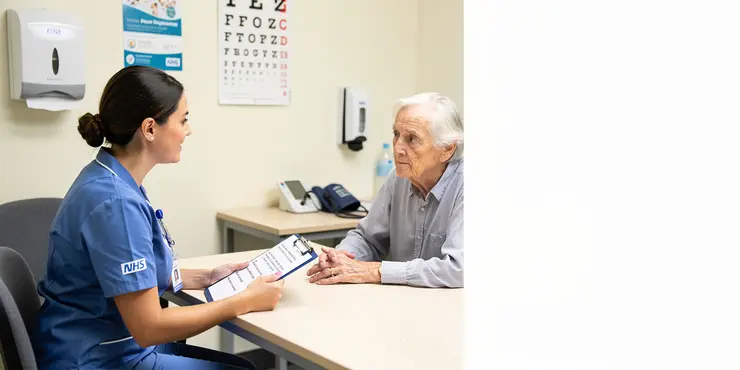
How is dementia diagnosed?
Relevance: 18%
-
How are eating disorders diagnosed?
Relevance: 18%
-
How do I know if my surgery is considered elective or urgent?
Relevance: 18%
-
How is health-related anxiety diagnosed?
Relevance: 18%
-
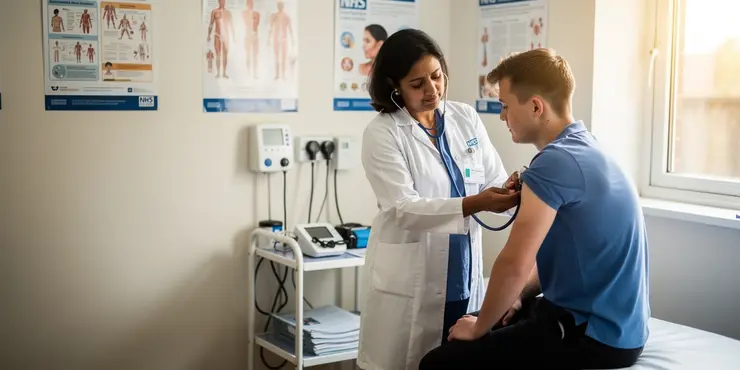
How is Chikungunya virus infection diagnosed?
Relevance: 18%
Introduction to Appendicitis
Appendicitis is a common medical condition where the appendix, a small tube-shaped part of the large intestine, becomes inflamed and filled with pus. This condition mostly affects people between the ages of 10 and 30, but it can occur at any age. Timely diagnosis of appendicitis is crucial to prevent complications such as a ruptured appendix, which can be life-threatening.
Clinical Examination
The diagnostic process for appendicitis often starts with a thorough clinical examination conducted by a healthcare professional. During this examination, the doctor will assess the patient's medical history and symptoms. Classic symptoms of appendicitis include abdominal pain starting near the navel and moving to the lower right side, nausea, vomiting, and a lack of appetite. The doctor will typically perform a physical examination, which may involve applying gentle pressure to the abdomen to check for tenderness or rigidity, particularly in the lower right quadrant.
Laboratory Tests
Laboratory tests can support the diagnosis process. A complete blood count (CBC) is commonly ordered to check for elevated white blood cells, which can indicate infection or inflammation in the body. A urinalysis might also be conducted to rule out urinary tract infections or kidney stones, which can mimic appendicitis symptoms.
Imaging Tests
Imaging tests are critical tools in diagnosing appendicitis. An ultrasound of the abdomen is often the first imaging test used, especially in children and pregnant women, as it is a non-invasive procedure with no radiation. However, a computed tomography (CT) scan is considered the gold standard for diagnosing appendicitis due to its high accuracy in visualizing the appendix and identifying any signs of inflammation or complications such as perforation.
Additional Diagnostic Methods
In certain cases, a magnetic resonance imaging (MRI) scan may be used, particularly for pregnant women, to avoid radiation exposure. Additionally, if the diagnosis remains uncertain, diagnostic laparoscopy might be considered. This surgical procedure allows the doctor to have a direct view of the appendix and surrounding organs, confirming appendicitis and potentially treating it simultaneously.
Conclusion
Diagnosing appendicitis involves a combination of clinical evaluation, laboratory testing, and imaging studies. Early and accurate diagnosis is essential to initiate appropriate treatment and prevent complications associated with a delayed diagnosis of appendicitis. Those experiencing symptoms suggestive of appendicitis should seek medical attention promptly for a thorough assessment and timely management.
What is Appendicitis?
Appendicitis is when the appendix, a small part of the gut, gets swollen and full of pus. It often happens to people ages 10 to 30, but anyone can get it. It is important to know if someone has appendicitis quickly so they can get help and feel better. If not, it can get very serious.
Doctor's Checkup
To find out if someone has appendicitis, a doctor will check them. The doctor will ask about their health and how they feel. Common signs are a sore tummy that starts near the belly button and moves to the right side, feeling sick, throwing up, and not feeling hungry. The doctor will gently press on the belly to see if it hurts, especially on the right side.
Tests
Tests can help find out more. A blood test checks for more white cells, which show an infection. A pee test might be done to make sure it's not a urine or kidney problem.
Pictures and Scans
Pictures of the belly can help see if the appendix is swollen. An ultrasound is often done first, especially for kids and pregnant women, because it's safe and easy. A CT scan gives a very good picture. It is the best way to know if appendicitis is the problem.
Other Ways to Check
Sometimes, an MRI scan is used, often for pregnant women, to avoid radiation. If doctors are still unsure, a small surgery, called laparoscopy, can look inside the belly. It can help the doctor see the appendix directly and even fix it if needed.
In Summary
Finding out if someone has appendicitis needs doctor checkups, tests, and pictures. Finding it early helps stop serious problems. If someone feels signs like tummy pain, they should see a doctor quickly. Getting help early is very important.
Frequently Asked Questions
What is the first step in diagnosing appendicitis?
The first step is typically a clinical evaluation by a healthcare provider, who will review your symptoms and perform a physical examination.
What role does medical history play in diagnosing appendicitis?
Medical history helps the doctor understand the patient's symptoms and any previous issues that might mimic appendicitis.
Which physical signs are checked during the examination?
Doctors often check for tenderness in the lower right abdomen, rebound tenderness, and guarding.
What imaging tests are used to diagnose appendicitis?
Common imaging tests include an abdominal ultrasound, CT scan, and sometimes an MRI.
How does an ultrasound help in diagnosing appendicitis?
An ultrasound can visualize the appendix and show signs of inflammation or enlargement.
Why is a CT scan often used in diagnosing appendicitis?
A CT scan provides detailed images of the abdomen and can more accurately identify an inflamed appendix.
Can blood tests indicate appendicitis?
Yes, blood tests can show elevated white blood cell counts, suggesting an infection or inflammation.
Are urine tests relevant in diagnosing appendicitis?
Urine tests help rule out urinary tract infections or conditions like kidney stones that might mimic appendicitis.
What is the role of MRI in diagnosing appendicitis?
MRI is sometimes used, especially in pregnant women, to avoid radiation exposure from CT scans.
How does age affect appendicitis diagnosis?
Diagnosis can be more challenging in very young or elderly patients due to atypical symptoms.
Does gender affect the symptoms of appendicitis?
Yes, symptoms can differ slightly between males and females, and gynecological issues can mimic appendicitis in females.
Can an appendicitis diagnosis be confirmed without imaging?
In some cases, clinical evaluation alone can be sufficient, but imaging is often used for confirmation.
How important is early diagnosis of appendicitis?
Early diagnosis is crucial to prevent complications such as a ruptured appendix and peritonitis.
Can appendicitis be diagnosed with laparoscopy?
Yes, diagnostic laparoscopy can be used if diagnosis remains uncertain after other tests.
What are some common symptoms besides abdominal pain?
Symptoms can include nausea, vomiting, fever, and loss of appetite.
How long does it typically take to diagnose appendicitis?
Diagnosis can take a few hours to a day, depending on symptoms and the need for tests.
What other conditions can mimic appendicitis symptoms?
Conditions like gastroenteritis, urinary tract infections, and ovarian cysts can mimic appendicitis.
How is appendicitis distinguished from gastroenteritis?
Gastroenteritis often involves diarrhea, which is not a common symptom of appendicitis.
What should I do if I suspect I have appendicitis?
Seek immediate medical attention, as prompt treatment is important.
Can appendicitis diagnose itself without treatment?
No, untreated appendicitis can lead to severe complications and requires medical intervention.
What do doctors check first to find out if you have appendicitis?
The first step is to see a doctor. The doctor will talk to you about how you feel and check your body to see what's wrong.
How does knowing your health history help doctors find out if you have appendicitis?
A person's medical history helps the doctor understand what is making them feel unwell. It also helps the doctor know about any past problems that might look like appendicitis.
Here are some tools that can help:
- Ask the doctor to explain big words in simple terms.
- Use pictures or drawings to understand better.
- Take notes or ask someone to write things down for you.
What does the doctor look for in a check-up?
When you visit the doctor, they will look for signs to see how healthy you are. Here are some things they might check:
- Your temperature to see if you have a fever.
- Your heartbeat to make sure it's regular.
- Your breathing to see if it's normal.
- Your skin to check for any changes or rashes.
If you need help, you can ask someone you trust to go with you to the doctor. It's also okay to ask the doctor questions if you don't understand something.
Doctors often check your tummy to see how it feels. They press on the lower right side of your belly. They also see if it hurts more when they let go after pressing.
What tests do doctors use to check for appendicitis?
Doctors use special machines to look inside your body. These machines take pictures of your tummy. The pictures help doctors see if everything is okay.
The tools doctors use are called an ultrasound machine, a CT scan, and sometimes an MRI machine.
How does an ultrasound help find appendicitis?
An ultrasound is a special picture of the inside of your body. It can help doctors see if your appendix is inflamed (sore and swollen).
When you have a tummy ache, the doctor might use an ultrasound to check your appendix. If it looks puffy and bigger than normal, it might mean appendicitis.
Using an ultrasound is good because it does not hurt. It helps doctors decide if you need more help right away.
An ultrasound is a special picture that can show the appendix. It helps doctors see if the appendix is swollen or bigger than usual.
Why do doctors use a CT scan to find out if you have appendicitis?
A CT scan is a special type of picture.
It helps doctors see inside your tummy.
Doctors use it to check if your appendix is swollen or sick.
The picture helps them decide if you need help or medicine.
If you have trouble reading, you can ask someone to read it to you.
You can also use a computer to read the text out loud.
A CT scan is a special camera that takes pictures inside your tummy. It helps doctors see if your appendix is swollen or not.
Can blood tests show if you have appendicitis?
Yes, blood tests can show if there are more white blood cells in your blood. This might mean you have an infection or swelling.
Do pee tests help find out if you have appendicitis?
Urine tests check your pee to see if you might have a bladder infection or kidney stones. These problems can seem like a sore appendix. The appendix is a small part in your belly that can hurt a lot if it's sick.
How does an MRI help find out if someone has appendicitis?
An MRI is a type of scan that takes pictures inside the body. It helps doctors see if the appendix is swollen and infected, which means appendicitis. An MRI can be very useful because it does not use X-rays, so it is safe. Some people might find an MRI scary, but it does not hurt.
Here are some tips to help you if you need an MRI:
- Ask someone to come with you for support.
- You might be able to choose music to listen to during the scan.
- The staff will explain everything to you, so don't be afraid to ask questions.
MRI scans are used sometimes, especially for pregnant women, because they don't use radiation like CT scans do.
Does age change how doctors find appendicitis?
Doctors use different tools to see if someone has appendicitis, which is when the appendix gets sick. Your age can change how doctors find appendicitis.
Here's how:
- Children: Doctors check your tummy and ask about pain. They might do an ultrasound scan, which uses a camera to look inside your body.
- Grown-ups: Doctors can do blood tests or a CT scan. This helps them see more about the appendix.
- Older people: They might have other health problems, so doctors need to be careful. They use tests to make sure it is appendicitis.
Ask a grown-up to help you understand more if you need it. You can also use pictures or videos to learn about the body and appendicitis.
It can be harder for doctors to find out what is wrong with very young children and older people because their symptoms can be unusual.
Do boys and girls get different signs when they have appendicitis?
Appendicitis is when a small part in your tummy gets sore.
People might feel different when they have it.
Boys and girls might feel it in different ways.
To help understand this, you can:
- Look at pictures of the body.
- Ask a grown-up to explain.
- Use apps that show body parts.
Yes, boys and girls can have different signs. For girls, some problems with their body can look like appendicitis.
Can doctors know if you have appendicitis without using a scan?
Sometimes, doctors can figure out what's wrong just by looking at you and asking questions. But usually, they use special pictures, like X-rays, to be sure.
Why is it important to find out if you have appendicitis early?
Finding out about the sickness early is very important. It helps to stop big problems, like a burst appendix or a painful infection in the belly called peritonitis.
Here are some tips to help understand health information better: try using picture books about health, watch videos that explain health topics, and talk to a doctor or nurse if you have questions.
Can doctors find appendicitis with a small camera surgery?
Doctors can use a tool called a laparoscope. This is a tiny camera that helps them see inside your tummy. They make a small cut to put the camera in. This helps doctors check if the appendix is sick. This tool helps doctors decide if you have appendicitis.
If reading is hard, try listening to audio books or using pictures to help understand.
Yes, doctors can use a special operation called a diagnostic laparoscopy if they are still not sure what is wrong after other tests.
What other signs are there besides tummy pain?
Here are some other signs you might notice:
- Feeling tired
- Feeling sick or wanting to vomit
- Changes in going to the toilet
- Fever or feeling hot
- Not feeling hungry
If you find it hard to understand, you can:
- Ask someone to read it to you
- Use a text-to-speech app
- Highlight important words
You might feel sick to your stomach or throw up. You could also have a high temperature and not feel like eating.
How long does it take to find out if someone has appendicitis?
Appendicitis is when your appendix is sore and can make your tummy hurt.
Doctors use questions and tests to find out if you have it.
It usually takes a few hours.
This can include a visit to the doctor and maybe some extra tests like an ultrasound.
Ask the doctor if you need more help understanding.
You can use pictures or simple words to help explain it, too.
Finding out what's wrong can take a few hours or up to a day. It depends on how you feel and if you need any tests.
What else can feel like appendicitis?
Some illnesses feel like appendicitis. These can be:
- Stomach bug: A tummy virus can hurt and make you feel sick.
- Kidney stones: These cause sharp pain in your side or back.
- Gallstones: Pain might be in your upper tummy or right side.
- Constipation: This can cause tummy pain and make you feel bloated.
- Urinary tract infection (UTI): You might feel pain and have a need to pee often.
If you have tummy pain, tell a grown-up. They can help you see a doctor.
Tools to help:
- Use pictures to show the different illnesses.
- Try apps that explain health in simple words.
Some health problems can seem like appendicitis. These include tummy bugs, bladder infections, and cysts on the ovaries.
What is the difference between appendicitis and gastroenteritis?
Appendicitis: This is when the appendix in your tummy gets sore and swells up. It might hurt a lot on the lower right side of your belly.
Gastroenteritis: This is often called a stomach bug. It can make your tummy hurt all over, plus you might feel sick and have diarrhea.
If your tummy really hurts for a long time, it's important to see a doctor. They can help find out what's wrong.
Sometimes, it's helpful to look at pictures or use simple videos online to understand more. Ask an adult to help you find them.
Gastroenteritis usually makes you have diarrhea. Diarrhea does not usually happen if you have appendicitis.
What should I do if I think I have appendicitis?
If you think you have appendicitis, tell an adult you trust right away. Appendicitis can make your belly hurt a lot. It happens when a small part inside your belly gets swollen and needs help from a doctor.
Here are some steps you can take:
- Tell someone like your parent or teacher how you feel.
- Go to a doctor quickly so they can check what's wrong.
- Don't eat or drink anything until you see a doctor, just in case they need to do tests.
If you have trouble understanding or reading, ask an adult to help you. They can read with you or explain things. Picture charts and videos can also help you understand.
Get a doctor right away. It is really important to get help quickly.
Can your body fix appendicitis by itself without seeing a doctor?
No, if you do not treat appendicitis, it can cause big problems. You need to see a doctor.
Useful Links
This website offers general information and is not a substitute for professional advice.
Always seek guidance from qualified professionals.
If you have any medical concerns or need urgent help, contact a healthcare professional or emergency services immediately.
Some of this content was generated with AI assistance. We’ve done our best to keep it accurate, helpful, and human-friendly.
- Ergsy carfully checks the information in the videos we provide here.
- Videos shown by Youtube after a video has completed, have NOT been reviewed by ERGSY.
- To view, click the arrow in centre of video.
- Most of the videos you find here will have subtitles and/or closed captions available.
- You may need to turn these on, and choose your preferred language.
- Go to the video you'd like to watch.
- If closed captions (CC) are available, settings will be visible on the bottom right of the video player.
- To turn on Captions, click settings .
- To turn off Captions, click settings again.
More Items From Ergsy search
-

How is appendicitis diagnosed?
Relevance: 100%
-

Is appendicitis hereditary?
Relevance: 97%
-

What is Appendicitis?
Relevance: 93%
-

What are the potential complications of appendicitis?
Relevance: 87%
-

What causes appendicitis?
Relevance: 87%
-

What is the treatment for appendicitis?
Relevance: 85%
-

Where is the pain located when you have appendicitis?
Relevance: 85%
-

Can appendicitis occur more than once?
Relevance: 85%
-

What are the common symptoms of appendicitis?
Relevance: 84%
-

What happens if appendicitis is left untreated?
Relevance: 83%
-

How soon should you see a doctor if you suspect appendicitis?
Relevance: 82%
-

What is the likelihood of needing surgery for suspected appendicitis?
Relevance: 82%
-

Can appendicitis be treated with antibiotics?
Relevance: 82%
-

Can appendicitis go away on its own?
Relevance: 80%
-

Is appendicitis common in any particular age group?
Relevance: 79%
-

How is appendicitis different from other causes of abdominal pain?
Relevance: 76%
-

Can diet or lifestyle changes prevent appendicitis?
Relevance: 75%
-

Prostate cancer diagnosis and tests
Relevance: 51%
-

BSL - Diagnosis of panic disorder
Relevance: 50%
-

Head and Neck Cancer Diagnosis
Relevance: 50%
-

Are AI systems used alone in lung cancer diagnosis or alongside human radiologists?
Relevance: 48%
-

Attention deficit hyperactivity disorder (ADHD) - Diagnosis
Relevance: 46%
-

BSL - Diagnosis of obsessive compulsive disorder (OCD)
Relevance: 46%
-

What is the life expectancy after a motor neurone disease diagnosis?
Relevance: 41%
-

Can you live without an appendix?
Relevance: 38%
-

Are there any risk factors for appendicitis?
Relevance: 35%
-

Stomach ache and abdominal pain
Relevance: 21%
-

How is autism diagnosed?
Relevance: 19%
-

How is shingles diagnosed?
Relevance: 19%
-

How is asthma diagnosed?
Relevance: 19%
-

How is scabies diagnosed?
Relevance: 19%
-

How is flesh-eating disease diagnosed?
Relevance: 19%
-

How is motor neurone disease diagnosed?
Relevance: 19%
-

How is psoriasis diagnosed?
Relevance: 19%
-

How is Huntington's disease diagnosed?
Relevance: 19%
-

How is dementia diagnosed?
Relevance: 18%
-
How are eating disorders diagnosed?
Relevance: 18%
-
How do I know if my surgery is considered elective or urgent?
Relevance: 18%
-
How is health-related anxiety diagnosed?
Relevance: 18%
-

How is Chikungunya virus infection diagnosed?
Relevance: 18%


